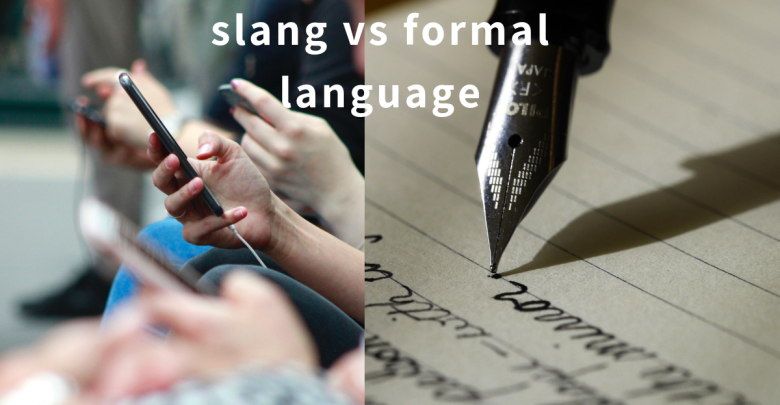Point/Counterpoint: Slang versus formal language
 Helen Zhang
Helen ZhangSlang
My past self would’ve had his wig in orbit if he found that not only am I using, but also defending informal language.
Allow me to make up for my past closed-mindedness. Some might argue that by not following the rules of language, you tell others you’re too stupid to know better. Using Shakespeare’s legacy as an example, many of today’s “proper” words and phrases were once brand-new, fresh-out-the-brain, certifiable slang, popularized by his works. That’s right: one of the most influential poets to use the English language stanned slang.
The idea that proper language is somehow better is also classist, because it frequently targets members of the middle and lower class for not having the privilege of receiving a more thorough education. Ngl, antagonizing the lower class is kinda cringe. Not to mention that halting a discussion just to point out that someone used the wrong “their/there/they’re” or missed an S in Mississippi adds nothing to the conversation, and often derails it.
If the purpose of language is to convey ideas, and if a slang term conveys an idea more concisely or clearly than formal language, we’re limiting our own ability to communicate by not using it. Why would anybody say “I resonate strongly with this” when a simple “big mood” will do?
Slang can also be very handy as an icebreaker while getting to know someone. As soon as I hear a “yeet” leave someone’s lips, I feel a whole lot more comfortable talking to them. Slang can also act as a way to express your individual identity, as it can let you express your ethnic, cultural, or occupational background.
I hope that with time, people will lose their prejudice towards new words and grammar, and embrace their usefulness in making our communication more effective and fun.
– Nicholas Bombardieri
Formal language
Although language is always changing, and slang can be utilized to express deeper layers of meaning, not every new deviation is a true stroke of genius.
Rebelling against formal language is not quite the brave revolution against classist pigs that it’s made out to be. For example, “y’all” is a fun, gender-neutral way of addressing a group of people as opposed to “you guys,” and I like the subtle yeehaw undertone. But then people begin to think that they can contract and simplify everything. The result? “Y’all’d’ve’f’I’d’ve,” which I can only describe as an over-salted, mushy bowl of alphabet soup. Even Shakespeare only created new words by sewing together pre-existing words.
As for spelling correctly, it’s really about preventing an aneurysm every time we read an article. Imagin reeding a paragraf ful of speling erors bcoz a person dosnt want 2 type out they’re wrods propery. U wud hav to pause at evy word 2 figer out wat their syain.
There’s a reason we moved to standardized spelling, okay? Old English was full of spelling variations, and sometimes people would use completely different letters as substitutes in their writing. Moving to a standardized spelling system after the invention of the printing press led to more accessible education and efficient communication.
Imagine trying to learn English as a second or third or fourth language, and everyone is spelling words differently because “sTAndARdiZed sPelLing iS ClaSsiSt.” If anything, insisting on misspelling English on purpose can be classist. It assumes that everyone should have a deep enough working knowledge of the English language and its complexities to be able to understand that idiotic sounding syllables like “teh” is a purposeful misspelling of “the” for sarcastic effect.
The point of this rant is, there is a reason we gravitate towards standardization and familiarity. Of course we understand when someone makes a small mistake of confusing “they’re/there/their,” or accidentally leave out a letter in “Mississippi.” I even enjoy Salt Bae-ing a “yeet” in my speech here or there. I don’t expect to experience the eloquence of Murakami in a text from a friend. But please, please do not force me to pause at every word to try and decipher its meaning, because I will unfriend you and take a nap instead.
– Tina Tai




